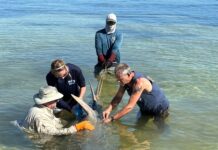#1 How we got to this point (Sept. 27, 2018)
#2 The hurricane evacuation model’s influence on development (Oct. 4, 2018)
#3 What the “takings” lawsuit might look like (Oct. 11, 2018)
#4 Options to avert chaos (Oct. 18, 2018)
#5 In conclusion … (Oct. 25, 2018)
In a little more than five years, new development will come to a grinding halt in the Florida Keys. At least, that is what the State of Florida has decreed for the islands it has designated an “Area of Critical Concern.” Beginning in 2023, it will no longer issue NEW building permits for Keys municipalities. None. Zilch. Zip. Nada. If this comes to pass, what happens next? Will landowners sue because the state (and local governments) is gutting the value of their investment by preventing them from building their dream home on their vacant lot? Will that raise taxes? What will happen to real estate values? Will builders be out of business? The ramifications are wide and far-reaching. The future starts now.
By Frank Greenman
The concern over the 2023 moratorium only affects those property owners who own un-built, buildable lots. That leaves 77,000 other existing residents of the Keys to deal with the permit problem, but more importantly, with the other issues that impact on the quality of life in the Keys.
The state’s regulatory authority seems, after 25 years of oversight, outdated and not relevant to our current circumstance. There has been good progress made, in environmental protection, with the acquisition of large tracts of environmentally sensitive land, and the huge improvement in our nearshore water with the advent of central sewer systems throughout the Keys. Our enhanced building codes, now display the difference in destruction in the panhandle after hurricane Michael and the strength of our newer buildings after hurricane Irma. Our local governments have improved services while demonstrating admirable transparency and efficiency.
The question has to be, is state oversight offering any real improvement to our current quality of life? The 2023 moratorium is both unwarranted and unnecessary, and state oversight has not impacted at all on the more pressing issues such as the education of our children, the resiliency of our economy, or most importantly the type and kind of communities we will become. The state’s restriction has had the predictable outcome of artificially raising property values, stifling workforce housing and squeezing our working population. And now that problem is exacerbated with the state’s shortsighted preemption of local control over vacation rentals.
There is no vision to state oversight, only regulation with diminishing benefit. And the existence of state oversight is an inhibiting restraint on vigorous or imaginative local efforts to shape our own destiny.
There has long been a debate about what is the ambience of the Keys and how best to protect it. Is there a ‘tipping point’ where the Keys will no longer be what is expected, but some variation of Boca Raton with all the quirky small town virtues of this unique place lost forever? As the population of Florida (and the country) grow, is the loss of ‘Olde Key West Charm’ and the Keys as fishing villages inevitable? And isn’t that discussion best left to those of us who live here, and the leaders we select?
Are we planning for beautification, adequate housing, better schools, and a more robust economy? We must not let the focus on hurricane evacuation, or the effects of a 2023 moratorium, blind us to ignore those steps that can assure that the Keys of tomorrow is a better successor to the Keys of today. And those decisions will never come from the state, but only from those of us who live here, and speak up for what is needed to create a better future for all of us — residents and visitors. It is a discussion worth having.
The whole point of ROGO and Area of Critical Concern was to slow down development until we could buy enough environmentally sensitive lands, get our roadways built like the new 7 Mile Bridge, save the endangered species, and handle evacuation in a sensible manner. And we have done that. We’ve won the war, and at some point (the state) should declare victory. There is very little left to buy. And whatever is important, the state should step up and buy.
— Ed Swift, Key West developer and former commissioner
A collective body of stakeholders (TDC, Lodging Association, municipalities, business, banks, etc.) need to … find the “sweet spot” of restoring the ecosystem while maintaining a healthy economy. In a nutshell: we need to find both the economic and ecological carrying capacities, and overlap them. The economy and environment should not be competing interests, they need to be integrated and balanced. The only way to achieve this is via a consensus building process that establishes a sense of reciprocal trust and common commitment among its members. We must bring together diametrically opposed stakeholders and give them an opportunity to gradually realign their positions to reach sustainable solutions. If we don’t, the quality of life in the Florida Keys will decline.
— Roman Gastesi, Monroe County Administrator
By 2023 market forces will take over. Insurance companies understand risks, meaning windstorm and flood rates will rise to reflect dangers from rapidly intensifying storms and higher surge. ROGOs for homes with unrestricted evacuation rights will be a commodity for sale that will allow construction to continue when some owners abandon repetitively damaged homes. Takings cases, when successful, will be settled for much smaller amounts as the economics of building to stronger code requirements and evidence of rising seas quench desires for building second and third homes. Workforce housing affordability will continue to be an issue because median income continues to rise as the lowest paid workers leave the Keys.
— Mark Songer, Last Stand
Solving our development challenges is going to take continued collaboration at all levels of government and we’ve got to keep thinking outside the box about how to balance public safety and the protection of our unique environment with responsible and sustainable growth. That means utilizing the set-aside for land acquisition under the Florida Keys Stewardship Act that I passed in 2016 to reduce exposure while also employing programs like the County’s Less Than Fee proposal. I also think we need to keep the open and collaborative dialogue going with the Department of Economic Opportunity, something I’ve worked hard to develop since I was elected in 2012. If we keep strengthening these partnerships I have no doubt that we will be able to provide additional housing options for our workforce, and minimize the exposure of our local and state governments while also working to make sure we can evacuate Monroe County safely and preserve the incredible natural resources that draw millions of tourists to the Florida Keys each year.
— State Rep. Holly Raschein
The 2023 building moratorium stems from decisions made decades ago that didn’t consider one critical issue — climate change. Fortunately we are about to rid Tallahassee of Gov. Rick Scott and many of his climate-change-denying cronies and hopefully install lawmakers who take this issue seriously. Florida must revisit the 2023 moratorium taking into account rising sea-levels, super storms and most importantly, empowering Monroe County leaders to make this decision.
— Steve Friedman, candidate for state representative
My greatest concern is the rigidity with which our state and local officials continue to uphold a decision made almost 25 years ago. The Keys are considerably different today. We need new thinking, new technology, and new approaches brought to bear on this very important issue.
— Josh Mothner, developer and Realtor
Public safety concerns will continue to influence decisions on future growth limits in the Keys. Vehicle capacity of the road and hurricane evacuation timelines will remain a development constraint as long as private vehicles are the primary means of evacuation. Also, adaptation and sustainability impacts of sea level rise will have increasing influence on future development opportunity analysis. Additional variables like improved building codes, improved weather forecasting, utilities capacity, services capacity and land conservation requirements will all need to be evaluated to determine if any future growth beyond 2023 can be permitted.
I’m not exactly sure what the situation will be in 2023, but I do believe there will always be redevelopment, upgrades and improvements made to existing structures. There will be future storms. There will be unused building rights circulating. It will be different and our review and permitting processes will have to adapt to these new realities.
— Seth Lawless, Village of Islamorada manager
The Land Authority’s role of land acquisition from willing sellers remains important but it can’t resolve the 2023 issue alone. Partnering with the county and state on land buying is paying off after several years of inaction. As part of the triad of comprehensive planning, land acquisition and environmental permitting, we are working to protect one of this nation’s most unique places. The 2016 Florida Keys Stewardship Act addressed our special status and needs as an Area of Critical State Concern. Funding will always be a consideration, but remember few people thought central sewer would ever happen — it did, at a cost approaching $1 billion. The state has spent more than $244 million on parks and conservation lands in the Keys. Answering the 2023 issue can be done, and the Land Authority is ready to do its part in making this a reality.
— Charles Pattison, Monroe County Land Authority
The Land Authority has its own budget derived from tourist taxes and park surcharges (over $15 million for 2018-19 fiscal year) for the conservation lots, but what about the County “density reduction” lot purchases? And what about the maintenance of those lots? I believe they are purchased and maintained with our property taxes. All the liability is with the county property owners. We pay for the “density reduction” purchases, we pay for the maintenance of the lots, and we pick up the taxes that the county is not paying. (What is) the wisdom and the costs of this approach? How was it derived? I don’t remember the property owners being consulted by referendum on these purchases.
— Sylvia Hernandez, Duck Key
Don’t forget it all started when Julia Tuttle sent Henry Flagler a box with orange blossoms in it and Florida’s destiny was set in motion.
— Bobby Reaburn of Naples, formerly the Keys
I don’t think it is a bad thing to stop development with the exception of affordable/workforce housing. The keys infrastructure can hardly maintain what is already here and, we don’t need more homes that stand empty most of the year.
A few good reasons to stopping new development and restricting development to needed workforce housing in the future are:
1) Current values will likely rise,
2) Many old and rundown properties that are already developed will be replaced or updated and,
3) If the workforce situation is not fixed, people will simply go somewhere else because service will suck and then property values will drop because who wants to visit or live where there is bad service or hotels and restaurants are always understaffed?
— John Baker
The 2020 census and 2021 hurricane evacuation modeling will determine what happens in 2023. I hope the “team” that creates the modeling assumptions will give appropriate weight to growth, sustainable carrying capacity, evacuation, and quality of life. … Category 4 Irma gave us more than five days’ notice … at 48 hours, Michael was still a tropical storm with only a hurricane watch for the expected landfall. Is it safe to assume the Keys will always have 48 hours for those who choose to safely evacuate?
— Bill Hunter, Keys resident
We will likely see a prelude to the ultimate debate over extending the 24-hour evacuation time and ROGO as we now know it as a result of the 1,300 early evacuation affordable housing units that have recently been granted to the Keys by the state. It is likely that this initiative to help solve the affordable housing crisis … will be challenged by various groups who will fight against any further development in the Keys — even affordable/workforce housing that does not impact the 24 hour evacuation time. These are some of the same groups and interests who fought for many years against the widening of the 18-Mile Stretch which is one of the largest impediments to evacuation. … Evacuation and development have been inextricably combined in ROGO and likely will continue to be.
— Brian Schmitt, Realtor and developer
Without new development there will be an increase in redevelopment. Some of our older buildings especially U.S.1 properties will be replaced. Which is why I will continue to try to establish a beautification standard for U.S.1. It’s important that we have vision for our town for the future.
— Mark Senmartin, Marathon City Council.
Since the original study and evacuation model was completed, we have seen a dramatic increase in second home ownership, a large increase of vacation rentals, and a decrease in full time population. This coupled with increased NOAA modeling accuracy and predictability, improved roads, and evacuation practices tells me that 2023 will not be “doom and gloom.” I believe there will be room for more growth and am confident this growth will be managed by local governments appropriately to promote affordability and protect the Florida Keys taxpayer.
— Chuck Lindsey, Marathon City Manager
The building moratorium will allow our elected officials to regroup, and focus on other issues of concern such as beautification and quality of life. The city must learn to manage what they already have, and when our city is properly managed some managed new home building should resume, especially those that want to build a dream home on an empty residential lot already surrounded by other homes (in established neighborhoods). The existing hotel and motels may remodel or rebuild on old location, or the same property, but no more apartments, hotels or motels at any new location.
— Carlos Cuenca, Marathon
Many people have died waiting for permits and/or fighting the county in the courts just to get the right to build on their own properties. Which most have lost in court.
I look at it this way, when the plats were originally platted for residential etc., how do they have a right to take away people’s rights to build on their properties? … I believe it is against the Constitution of the United States what they have been doing to people who own land in the Florida Keys.
— Janet O’Flaherty, Big Pine Key
We have issued all our affordable permits and working to get 200 to 300 more from the county and state. Market rate permits are more valuable to the City of Marathon and Monroe County from a tax revenue standpoint, but right now we are trying to get all we can to minimize takings cases in the future should the state not change their minds and lift this limit.
— Dan Zieg, Marathon City Council
























